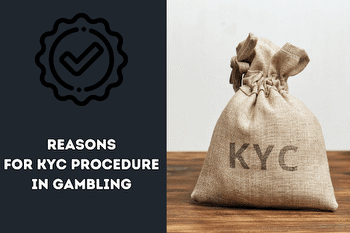Why Do Online Casinos Request ID Verification?

Where money flows, there is a need to ensure that all transactions are safe and secure. Not only this, but there needs to be definitive proof that there are no criminal activities that are the underlying source of the financial transaction.
Similar to any other businesses, online casinos must take steps to protect themselves against the risks of money laundering, fraud, bribery, and corrupt financial practices.
Furthermore, online casinos have to ensure their clients are protected from those who seek to illegally gain client information and funds. Verified information would also include IP addresses and telephone numbers where accounts are often accessed.
Identity verification is an important measure that legitimises the account holder, the nature of their business and the financial transacting. Along with KYC, the information gathered will be able to provide operators with insight into the legislation required to adhere to set industry regulations.
However, not all online casinos ask for ID proofs during registration. Moreover, no-verification casinos sites like the ones on https://casinogap.org/no-verification-casinos/, are more popular among players. This is because players do not like sharing their personal data on the internet.
About KYC
Know-your-customer (KYC) process is the due diligence casinos are supposed to conduct to verify clients. The process aims at authenticating client identification, risk factor and suitability to the business. Operators have to request clients for supporting documentation which will prove their identity and validate ownership of the account.
Information provided by the clients is cross-checked through third-party sources. KYC process requires businesses to analyse, and for gambling operators, it also enables them to access the financial affordability of their players to combat problematic gambling habits. For licensed operators with UKGC, this process enables the tracking of self-exclusion gamblers registered on GamStop and other self-exclusion sites.
Cryptocurrency casinos benefit from the process as it allows them to track illicit financial transactions from criminal activities. With the cooperation from financial institutions, they can ensure that cryptocurrency accounts are not connected and are able to fund criminal activities. These would place their players at risk as well, therefore due diligence through KYC.
Why Do Casinos Need To Check IDs?
The verification process legitimises access to gambling platforms. Persons under the age of 18 years are restricted from gambling. Verification also helps prove financial details ownership and that there are no fraudulent activities against bank accounts. Documentation required would be your social security information, address, bank account ownership and a photo of the individual. This is a protective measure for both the casino and the player.
It violates licensing terms for the operator to use the verification process to withdraw funds from a player’s account. The operator has to send notifications of reminders to the clients requesting documentation, for 12 months, before making charges against account maintenance.
a. Underage Gambling
There is a dedicated commitment to protecting those under the gambling age against the ills of gambling. The recognised gambling age with most international casinos is 18 years. Even so, studies have revealed that there has been gambling participation of individuals from as young as 11 years.
Easy access to gambling platforms requires stringent measures to ensure the exclusion of underaged gamblers. Gambling commissions regulating the industry have enforced strict restrictions on offering demo games and advertising gambling on media platforms easily accessible to minors. Operators found in violation of including minors in their gambling activities face fines and/ or the revoking of their licence.
b. Anti-Money Laundering
Money laundering is when the money which has been obtained through illicit and illegal means is concealed through transfers and transactions. The gambling industry is one of numerous which has fallen prey to these illegal activities.
Casinos have to ensure that all transactions processed through their multiple platforms are not connected to illegal activities. Identity verification is important as it requires clients to submit documentation that will legitimise their identity. This is done by performing due diligence checks on clients as well as KYC procedures. Should their identification verification fail, casinos are required to close these accounts and report to relevant authorities.
c. Fraud
Fraud is the intentional means of gaining benefits or money from another by the use of illegal means. Casinos are obliged to ensure that their systems prevent the use of fraudulent means, while regulators also work to protect players against fraudulent operator practices.
For casinos, this means ensuring that winnings, financial, personal information and identities of their clients are safeguarded at all times. Cybercriminals, particularly for online casinos, can target casinos to gain client information. Therefore, casinos have to ensure to perform due diligence on their systems to the employees who deal with client information. Violators could have their accounts closed pending investigation.
Conclusion
Though casinos may do all they can to protect against attackers, clients of the online sites too have the responsibility to perform checks to ensure their safety. It is prudent to search the site’s business information and verify its contact details. A reputable site will have reviews and company numbers with registration information on their site.
Never be afraid to check a licence certificate that you found online with the licencing commission. A website will include a privacy statement that includes details about the site and its domain. The information age opens up vulnerabilities, yet can equip clients with ways to protect themselves as well.
This is a submitted article.
Like or follow our Facebook page - to get daily news updates straight to your news feed.


































